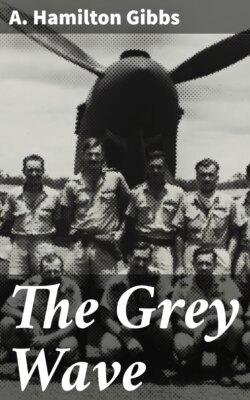Читать книгу The Grey Wave - A. Hamilton Gibbs - Страница 10
5
ОглавлениеTidworth, that little cluster of barrack buildings on the edge of the sweeping downs, golden in the early autumn, full of a lonely beauty like a green Sahara with springs and woods, but never a house for miles, and no sound but the sighing of the wind and the mew of the peewit! Thus I came to know it first. Later the rain turned it into a sodden stretch of mud, blurred and terrible, like a drunken street-woman blown by the wind, filling the soul with shudders and despair.—The barrack buildings covered perhaps a square mile of ground, ranged orderly in series, officers’ quarters—as far removed from Bucks and me as the Carlton Hotel—married quarters, sergeants’ mess, stables, canteen, riding school, barrack rooms, hospital; like a small city, thriving and busy, dropped from the blue upon that patch of country.
The N.C.O.’s at Tidworth were regulars, time-serving men who had learnt their job in India and who looked upon us as a lot of “perishin’ amatoors.” It was a very natural point of view. We presented an ungodly sight, a few of us in khaki, some in “blues,” those terrible garments that make their wearers look like an orphan’s home, but most in civilian garments of the most tattered description. Khaki gave one standing, self-respect, cleanliness, enabled one to face an officer feeling that one was trying at least to be a soldier.
The barrack rooms were long and whitewashed, a stove in the middle, rows of iron beds down either side to take twenty men in peace times. As it was we late comers slept on “biscuits,” square hard mattresses, laid down between the iron bunks, and mustered nearly forty in a room. In charge of each room was a lance-corporal or corporal whose job it was to detail a room orderly and to see furthermore that he did his job, i.e., keep the room swept and garnished, the lavatory basins washed, the fireplace blackleaded, the windows cleaned, the step swept and whitewashed.
Over each bed was a locker (without a lock, of course) where each man kept his small kit,—razor, towel, toothbrush, blacking and his personal treasures. Those who had no bed had no locker and left things beneath the folded blankets of the beds.
How one missed one’s household goods! One learnt to live like a snail, with everything in the world upon one’s person,—everything in the world cut down to the barest necessities, pipe and baccy, letters, a photograph, knife, fork and spoon, toothbrush, bit of soap, tooth paste, one towel, one extra pair of socks. Have you ever tried it for six months—a year? Then don’t. You miss your books and pictures, the bowl of flowers on the table, the tablecloth. All the things of everyday life that are taken for granted become a matter of poignant loss when you’ve got to do without them. But it’s marvellous what can be done without when it’s a matter of necessity.
Bucks unfortunately didn’t get to the same room with me. All of us who had come in the night before were paraded at nine o’clock next morning before the Colonel and those who had seen service or who could ride were considered sheep and separated from the goats who had never seen service nor a horse. Bucks was a goat. I could ride,—although the sergeant-major took fifteen sulphuric minutes to tell me he didn’t think so. And so Bucks and I were separated by the space of a barrack wall, as we thought then. It was a greater separation really, for he was still learning to ride when I went out to France to reinforce the fighting regiment which had covered itself with glory in the retreat from Mons. But before that day came we worked through to the soul of Tidworth, and of the sergeant-major, if by any stretch of the imagination he may be said to have had a soul. I think he had, but all the other men in the squadron dedicated their first bullet to him if they saw him in France. What a man! He stands out among all my memories of those marvellous days of training when everything was different from anything I had ever done before. He stands before me now, a long, thin figure in khaki, with a face that had been kicked in by a horse, an eye that burnt like a branding iron, and picked out unpolished buttons like a magnet. In the saddle he was a centaur, part of the horse, wonderful. His long, thin thighs gripped like tentacles of steel. He could make an animal grunt, he gripped so hard. And his language! Never in my life had I conceived the possibilities of blasphemy to shrivel a man’s soul until I heard that sergeant-major. He ripped the Bible from cover to cover. He defied thunderbolts from on high and referred to the Almighty as though he were a scullion,—and he’s still doing it. Compared to the wholesale murder of eight million men it was undoubtedly a pin-prick, but it taught us how to ride!
